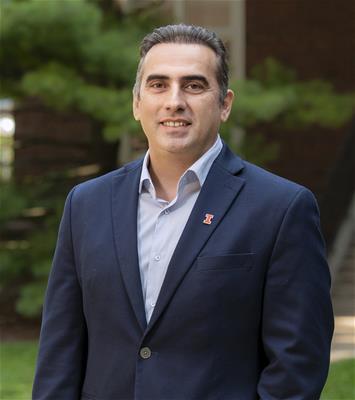Oct 19, 2022
Why loose food sales may not be the perfect package
In 2016, the Ad Council and the Natural Resources Defense Council launched the “Save the Food” public service campaign with a memorable video that offered all of the feels. “Life of a Strawberry” told the story of a fruit’s exciting adventure through the nation’s food system, complete with stirring music, thrilling conveyor-belt rides and even a brief romantic flirtation with a lime in a neighboring package. Unfortunately, the story doesn’t end well, with all the berries being thrown in the trash before they’re consumed. It’s a thought-provoking take on the waste that claims as much as 30% of America’s food supply every year. And it highlights the need for change.
 “Experts frequently suggest that package size adjustments are necessary to curb food waste,” said Gies teaching assistant professor Ismail Kirci, adding that many view loose food sales as the best way to achieve that. The idea is that less food would wind up in the trash if people only purchased what they need instead of buying consumables in large, pre-packaged amounts. To test that theory, Kirci and his coauthors set up a theoretical model that showed what happens when retailers provide both options and have the freedom to set their prices.
“Experts frequently suggest that package size adjustments are necessary to curb food waste,” said Gies teaching assistant professor Ismail Kirci, adding that many view loose food sales as the best way to achieve that. The idea is that less food would wind up in the trash if people only purchased what they need instead of buying consumables in large, pre-packaged amounts. To test that theory, Kirci and his coauthors set up a theoretical model that showed what happens when retailers provide both options and have the freedom to set their prices.
“People usually believe that if you sell it loose you are going to reduce waste, but that’s not always true,” said Kirci, explaining that it all boils down to the makeup of the community where those goods are sold. “When the market is homogeneous, selling loose is always better in terms of waste reduction.” Think of a college campus, where all the shoppers are students who buy perishable items in small amounts.
When there are at least two segments in the market, however, those efficiencies start to shift. “There are situations where a retailer who only sells things in packages is better off in terms of profit when he adds a loose option,” said Kirci. “In this case, however, waste increases because those retailers price their products in such a way that it forces consumers with higher consumption needs to buy larger-than-desired packaged quantities and consumers with lower consumption needs to buy the product loose.” According to Kirci, the waste in this situation is the result of an increase in purchase amounts.
Of course, government intervention could encourage more loose sales, either by lowering the taxes on loose items or doing other things to encourage their purchase. In France, for example, Kirci says the government is considering a law that could require retailers to dedicate 20% of their floor space to loose item sales by 2028. In America, where loose sales are less common, he says it might be a matter of engaging the public with information campaigns that reduce consumer resistance to non-packaged sales. Either way, there are many options yet to be explored.
Retail operations management is just one of the research topics that interests Kirci, whose path to academia is almost as unique as the journey of the strawberry in the video. For starters, his original degree wasn’t in business. Instead, he took the military route, earning a bachelor’s in industrial engineering from the Turkish Naval Academy in Istanbul and spending four years as an antisubmarine warfare officer. In 2008, however, he decided to change course. That decision led to a master’s in operations research, and eventually a PhD in operations management at the Jindal School of Management at the University of Texas-Dallas. In between there were other interesting jobs, including a research stint at NATO in Brussels and three years as an operations analyst and software developer for the Turkish navy. While his path to the head of the classroom is a little different than most, Kirci says his unique journey provide a rich catalog of experiences to share with the next generation of business leaders.
Kirci, who teaches BADM 275, BADM 377, and BADM 589 at Gies, began instructing in the spring of 2022 and is already happy to report that students from his first project management course have already earned internships based on what they learned.
The new teaching assistant professor says there are many things he likes about Gies, including the school’s exceptional faculty and the support he’s received as an incoming professor. But what he enjoys most of all is the response he gets when he tells people where he works. “People know the University of Illinois and Gies,” said Kirci. “It’s a privilege for me to be here.”
